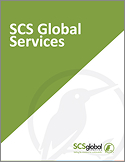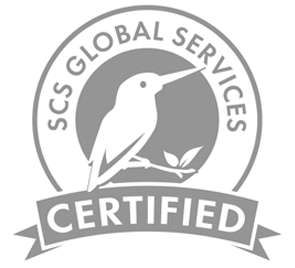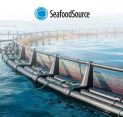Aquaculture Stewardship Council (ASC)
Certification for Farmed Fish and Seafood Production in South and Central America

- Latin America /
- Sustainable Fisheries and Seafood /
- Aquaculture Stewardship Council (ASC)

Seafood Certification Team
What is Aquaculture Stewardship Council (ASC)?
For fisheries based in Latin America, SCS provides Aquaculture Stewardship Council (ASC) farmed fish and seafood production certifications as well as ASC Feed Mill certification. We have worked with customers from Chile, Peru and Brazil all the way up both coasts to Mexico, providing services for the following ASC standards: Salmon, Trout, Seriola/Cobia, Shrimp, Abalone, and Tilapia. ASC certification assures consumers, retailers and buyers that aquaculture production conforms to the world's leading standard for responsibly farmed fish and seafood. These certifications demonstrate that farmed products were raised responsibly from both an environmental and social perspective.
Globally, ASC certified fish products are recognized and sold by major retailers based on consumer demand for sustainable and ethically source fish. The ASC standards were created to recognize and reward responsible aquaculture, and the standards were developed through a collaborative and transparent process with scientists, conservation groups, NGOs, aquaculture producers, seafood processors, retail and food service companies, and consumers.
Achieving ASC certification demonstrates that farmed products adhere to the highest standard of responsible aquaculture. Set your operation apart by becoming certified to ASC.
Why Choose SCS?
Ever since certifying the first fishery in LATAM in 2004, Baja Red Rock Lobster, SCS Global Servcies continues to build increased capacity and quality of service, now offering a comprehensive suite of seafood solutions spanning environmental sustainability, social responsibility, seafood safety, climate solutions, and more. With full time and contract auditors positioned throughout the LATAM region, our credibility, expertise, and cultural alignment to support seafood company needs is unmatched.
Benefits
ASC Certification provides independent assurance to your customers that your farmed fish and seafood products comply with rigorous environmental and social criteria, leading to the following benefits:
- Access to new markets and clients
- Increased sales to existing clients
- Reinforced company reputation
- Price premiums
- Increased worker and shareholder satisfaction
- Increased governmental recognition and support
- Access to development funding
- Full Assessment
- Pre-Assessment
- Process
- FAQs
- Documents
Eligibility
Any aquaculture producer who farms one of the species covered by the ASC standards can take part in the ASC certification program.
Pre-assessments
SCS offers pre-assessments for the following ASC standards:
- Abalone
- Bivalves (clams, mussels, oysters and scallops)
- Freshwater Trout
- Pangasius
- Salmon
- Shrimp
- Tilapia
Full-assessments
SCS is accredited to perform full-assessments for ASC Salmon, Abalone, Tilapia and Bivalves, and is currently a formal applicant for the ASC Shrimp standard. Please contact us if you are interested in becoming certified against additional ASC standards.
Accreditation (the ability to issue certificates) is open for the ASC Salmon, Pangasius and Tilapia standards. Accreditation for the bivalves, abalone, shrimp and freshwater trout standards is expected to open soon. SCS will make accreditation decisions according to demand. Please contact us if you are interested in becoming certified against any of these standards.
Certification Criteria
To receive certification, a client fishery must meet or exceed the minimum standards for legality, including: land and water usage; pollution and waste management; genetics and biodiversity; feed management; health management; veterinary medicines and chemicals; and social accountability.
Complementary Services
SCS also offers the convenience of combined Seafood Chain of Custody audits with HACCP based (hazard analysis critical control point) inspections through our seafood safety auditing programs.
Fisheries may be certified under the Marine Stewardship Council Standards
SCS Global Services can conduct pre-assessments against any of the ASC standards, whether in draft or final form. Pre-assessments allow producers to determine their conformity to emerging or existing ASC standards and identify any improvements needed. This sets producers up to be among the first companies certified, and to demonstrate to buyers their firm commitment to supplying ASC certified products.
A pre-assessment includes:
- Gap analysis of your operations against the standard
- Report identifying areas of improvement
To achieve certification, pre-assessment of any publically available standard is followed by a formal full assessment. Cost considerations for full assessment include the extent of production, the number and type of improvements needed, and the steps needed to audit these changes (e.g., is an onsite audit needed, what auditing skill set is required).
SCS offers pre-assessments for the following species:
- Abalone
- Bivalves (clams, mussels, oysters and scallops)
- Freshwater Trout
- Pangasius
- Salmon
- Shrimp
- Tilapia
-
Pre-Assessment (Optional)
SCS evaluates the qualifications of your aquaculture operation and determines what risks, if any, may limit your ability to successfully complete a rigorous and comprehensive assessment.
-
On-Site Farm Audit
SCS conducts a full farm assessment, following procedures described in the ASC's Farm Assessment Methodology. An independent assessment team reviews documentation, interviews stakeholders and evaluates aquaculture operations against specific environmental and social practices.
-
Audit Report and Public Comment
The SCS certification team writes a draft report, which is reviewed by the client and two independent peer reviewers. Information that relates to competitive advantage may be removed from the audit report at this point, in agreement with the assessment team.The report is then posted for public comment.
-
Certification Decision
After considering all comments, a final report is released that includes the final decision on whether or not to award certification. If no objections have been raised, the public certification report is published and your aquaculture operation receives a certificate from SCS. SCS can also provide client marketing support.
-
Maintain Certification
Certificates are valid for three years. Certification is subject to random surveillance audits in which critical control points such as harvest are observed.
What is the Aquaculture Stewardship Council?
The ASC is an impact-driven NGO whose mission is to make aquaculture more sustainable. Its standards were created to recognize and reward responsible aquaculture, developed through a collaborative and transparent process with scientists, conservation groups, NGOs, aquaculture producers, seafood processors, retail and food service companies, and consumers. The ASC certification program includes standards for farmed fish and seafood, for the seafood chain of custody, and for feed stocks. These standards conform to FAO Guidelines for Ecolabelling and the ISEAL Alliance Code of Conduct.
Why should my company get certified under the ASC standard?
Becoming ASC certified will demonstrate that your operation has been third-party audited to a stringent level of performance, via a label established collaboratively by public interest groups, industry, and academia. This contrasts starkly with programs that are industry-founded, do not involve third-party audited, do not have transparent governance structures, or do not include stakeholder engagement.
- For farm certification, apply here.
- For chain of custody certification, apply here.
What are the core principles underlying ASC certification?
- Legal Compliance and Effective Business Management
- Compliance with relevant national and local laws and regulations, and demonstration of sound business practices.
- Environmental Stewardship
- Minimizing impact on the environment, including habitat conservation, water quality, feed management, waste management
- Protection of Human Rights
- Includes fair labor practices, worker safety, and community engagement
- Responsible Animal Health and Welfare
- Includes disease management, fish health and welfare, minimized fish escapes into the wild
- Transparency
- Making standards, farm audits, and certification publicly available
- Traceability
- Ability to track any seafood item back through the supply chain to its source of origin
- Continuous improvement
- Updates based on scientific research, stakeholder feedback, and latest best practices.
What species are currently covered under ASC species-specific standards?
Examples include:
- ASC Abalone Standard
- ASC Bivalve Standard
- ASC Freshwater Trout Standard
- ASC Salmon Standard
- ASC Seriola and Cobia Standard
- ASC Shrimp Standard
- ASC Tilapia Standard
- ASC Feed Standard
- ASC Flatfish Standard
- ASC Pangasius Standard
- ASC Seabass, Seabream, Meagre Standard
- ASC Tropical Marine Finfish Standard
What is involved in ASC Chain of Custody (CoC) Certification?
Supply chain participants must have the necessary procedures and record keeping are in place to demonstrate that you:
- Receive certified seafood product directly from a certified fishery, farm, or CoC certified supplier.
- Keep certified seafood product separate from non-certified seafood while in your ownership (through storage, processing, packaging and sale/shipping).
- Have identified and addressed all risks of potential commingling of certified and non-certified product.
- Have records that provide traceability back to the source.
How much does certification cost?
Cost considerations for full assessment include the extent of production, the number and type of improvements needed, and the steps needed to audit these changes (e.g., is an onsite audit needed, what auditing skill set is required). Companies undergoing bundled certification services enjoy price discounts due to efficiencies (e.g., ASC Chain of Custody and Seafood HACCP).
How long does it take to get certified?
SCS is fully committed to customer service and responsiveness. The length of the assessment depends on a variety of factors, including: size and complexity of the operation, the types of procedures and records in place, etc. For farm assessments, the on-site farm visit itself typically take 1-4 days, undertaken by a two to three person assessment team, while the entire assessment usually takes 8 to 12 weeks. For chain of custody assessments, we typically complete the assessment and provide a certification decision within 6-8 weeks.
How long is certification valid?
ASC Farm and Chain of Custody certifications are granted for a three-year period, with annual surveillance audits to confirm continued compliance with the relevant standard.
Where can I find a listing of all SCS certified seafood farms?
Check out the ASC website Find a Farm feature.
Seafood Certification Team
SCS Certified Clients
Learn more about the clients we certify and where to find products with this certification.
Service Brochure





